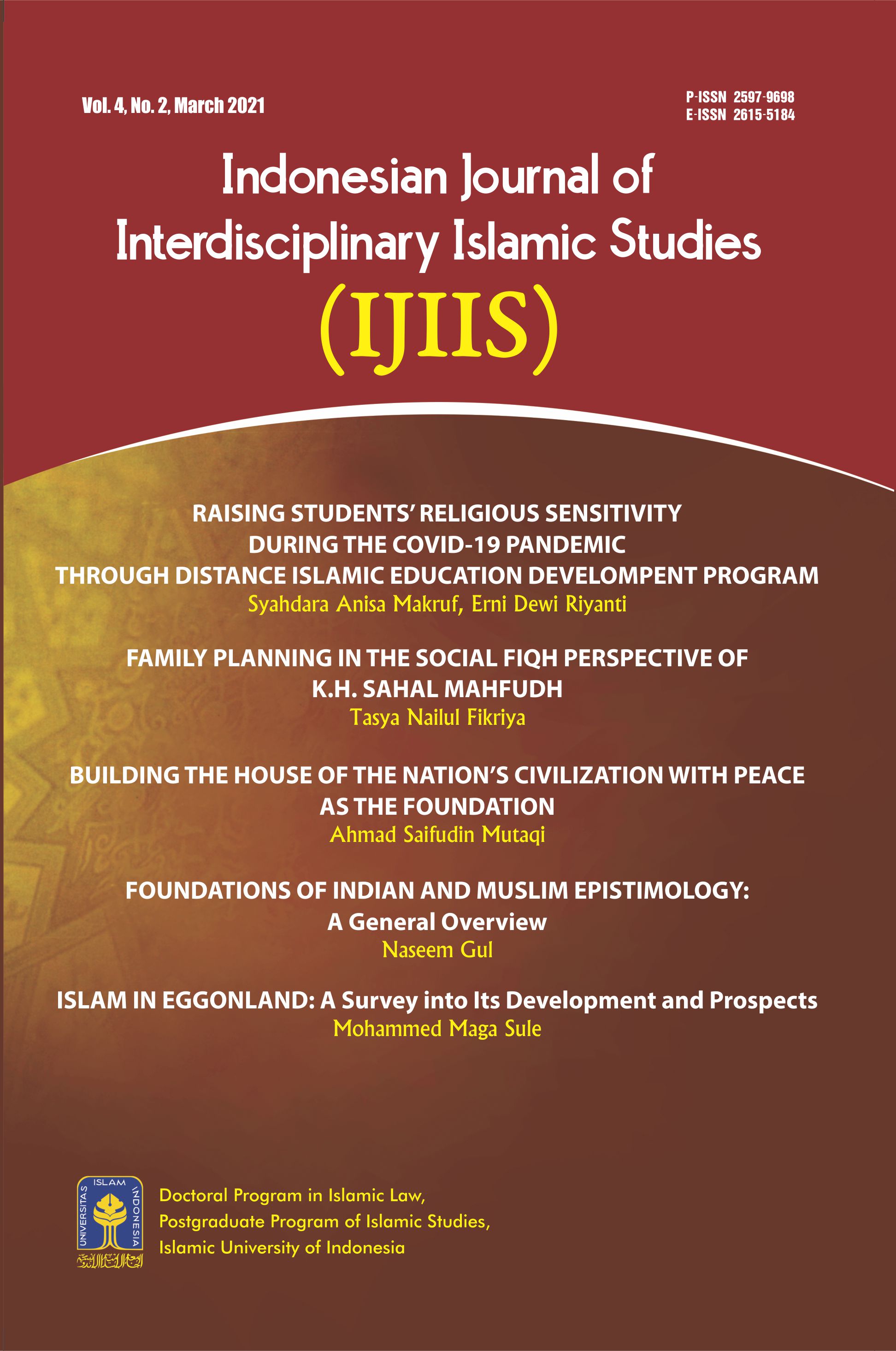Main Article Content
Abstract
This study entitled "Family Planning in the Perspective of Social Fiqh KH. MA. Sahal Mahfudh” is the result of literature research to answer the question how did family planning (KB) begin in Indonesia? How Family Planning in the perspective of KH social fiqh. MA. Sahal Mahfudh? How is the istinbath used by KH. MA. Sahal Mahfudh in the discourse of Family Planning (KB). In this study, the authors used a juridical normative approach and legal sociology. The results of this study indicate that Kiai Sahal views family planning as regulating child birth, not eliminating children. This is an effort / human effort to form a family full of maslahah. There are two kinds of social fiqh Kiai Sahal in the law of istinbath: Madzhab Qauli and Madzhab Manhaji. In the context of the KB discourse, namely through the Madzhab qauli and methodological thought (madzhab manhaji) at the same time. Qauli by referring to the hadith of Rasulullah SAW regarding 'azl and he also refers to the opinion of al-Ghazali, Ibn Hajar and Sayyid Sabiq which allow family planning. Then manhaji by considering the benefit. In addition, Kiai Sahal's opinion about family planning can also be termed the qiyas method, which is analogizing 'azl with family planning tools. According to Kiai Sahal, advances in medical science and technology, especially regarding the development of contraceptive service suggestions, from natural ones, following the calendar to the use of modern contraceptives, condoms, pills, IUDs, are essentially not much different from what is called 'azl. Because the development of social fiqh as exemplified by Kiai Sahal is always based on the principle of caring for the old but still good and relevant and taking the new which is better. In the perspective of Kiai Sahal's social fiqh, the family planning program is allowed because it aims among others to create quality families of Sakinah, Mawaddah, Wa rahmah and mashlahah families.
Keywords
Article Details

This work is licensed under a Creative Commons Attribution-ShareAlike 4.0 International License.
References
- Hauser, Philip M dan Robert W. Gardner, dkk. Penduduk Dan Masa Depan Perkotaan. Jakarta: Yayasan Obor Indonesia. 1985.
- “Katalog Badan Pusat Statistik Proyeksi Penduduk Indonesia 2010-2035”. Diakses pada 7 Februari 2017 dari www.bappenas.go.id.
- Fawcett, T James. Psikologi dan Kependudukan. Jakarta: CV. Rajawali. 1984.
- Baroroh , Umdatul dan Tutik Nurul Jannah. Fiqh Sosial Masa Depan Fiqh Indonesia. Pati: Pusat Studi Pesantren & Fiqh Sosial Institut Pesantren Mathali’ul Falah. 2016.
- Hartanto, Hanafi. Keluarga Berencana dan Kontrasepsi. Jakarta: Pustaka Sinar Harapan. 1994.
- Nafis, Cholil. Fikih Keluarga. Jakarta: Mitra Abadi Press. 2009.
- ______________ dan Abdullah Ubaid. Keluarga Maslahah Terapan Fikih Sosial Kiai Sahal. Jakarta: Mitra Abadi Press. 2010.
- ______________, Program KB dan Ulama’. Pati: Perpustakaan Maslakul Huda. 1986.
- ______________, Wajah Baru Fiqh Pesantren. Jakarta: Citra Pustaka. 2004.
- ______________, Pelaksanaan KB Nasional Ditinjau Dari Agama Islam. Pati: Perpustakaan Maslakul Huda. 1984.
- ______________, Nuansa Fiqh Sosial. Yogyakarta: LkiS. 2011.
- Naisaburi, Imam Abu Husain Muslim bin al-Hajjaj al-Qusyairi. al-Musnad al-Shahih al-Mukhtashor Bi Naql al-‘Adli ‘Ala al-‘Adli Ila Rasulillah SAW. Beirut: Dar Ikhya’ Al-Turats Al-‘Arabi.
- Ma’mur, Jamal dan Ali Romdhoni, dkk. Mempersiapkan Insan Sholih Akrom. Pati: Perguruan Islam Mathali’ul Falah. 2012.
- Ma’mur, Jamal, Fiqih Sosial Kiai Sahal Mahfudh: Antara Konsep dan Implementasi. Surabaya: Khalista. 2007.
- Munawir, A.W. Kamus Al-Munawir Arab-Indonesia Terlengkap. Surabaya: Pustaka Progressif. 1997.
- Hasbiyallah. Fiqh Dan Ushul Fiqh. Bandung: PT Remaja Rosdakarya. 2013.
- Burneo, Muhammad Shidqi bin Ahmad. al-wajiz Fi Idhachi Qawaidh al-Fiqhi al-Kulliyati. Riyadh: Muassah Ar Risalah 1983.
- Jannah, Tutik Nurul, Ed. Metodologi Fiqh Sosial dari Qouli Menuju Manhaji, Pati: Fiqh Sosial Institute STAI Mathali’ul Falah. 2015.
- Zahrah, Muhamad Abu. Ushul Fiqih. Jakarta: Pustaka Firdaus. 2008.
- Bakar, Abdul Al-Rahman bin Abi. Al-Dar Al-Mantsur. Beirut: Dar Al-Fikr.
References
Hauser, Philip M dan Robert W. Gardner, dkk. Penduduk Dan Masa Depan Perkotaan. Jakarta: Yayasan Obor Indonesia. 1985.
“Katalog Badan Pusat Statistik Proyeksi Penduduk Indonesia 2010-2035”. Diakses pada 7 Februari 2017 dari www.bappenas.go.id.
Fawcett, T James. Psikologi dan Kependudukan. Jakarta: CV. Rajawali. 1984.
Baroroh , Umdatul dan Tutik Nurul Jannah. Fiqh Sosial Masa Depan Fiqh Indonesia. Pati: Pusat Studi Pesantren & Fiqh Sosial Institut Pesantren Mathali’ul Falah. 2016.
Hartanto, Hanafi. Keluarga Berencana dan Kontrasepsi. Jakarta: Pustaka Sinar Harapan. 1994.
Nafis, Cholil. Fikih Keluarga. Jakarta: Mitra Abadi Press. 2009.
______________ dan Abdullah Ubaid. Keluarga Maslahah Terapan Fikih Sosial Kiai Sahal. Jakarta: Mitra Abadi Press. 2010.
______________, Program KB dan Ulama’. Pati: Perpustakaan Maslakul Huda. 1986.
______________, Wajah Baru Fiqh Pesantren. Jakarta: Citra Pustaka. 2004.
______________, Pelaksanaan KB Nasional Ditinjau Dari Agama Islam. Pati: Perpustakaan Maslakul Huda. 1984.
______________, Nuansa Fiqh Sosial. Yogyakarta: LkiS. 2011.
Naisaburi, Imam Abu Husain Muslim bin al-Hajjaj al-Qusyairi. al-Musnad al-Shahih al-Mukhtashor Bi Naql al-‘Adli ‘Ala al-‘Adli Ila Rasulillah SAW. Beirut: Dar Ikhya’ Al-Turats Al-‘Arabi.
Ma’mur, Jamal dan Ali Romdhoni, dkk. Mempersiapkan Insan Sholih Akrom. Pati: Perguruan Islam Mathali’ul Falah. 2012.
Ma’mur, Jamal, Fiqih Sosial Kiai Sahal Mahfudh: Antara Konsep dan Implementasi. Surabaya: Khalista. 2007.
Munawir, A.W. Kamus Al-Munawir Arab-Indonesia Terlengkap. Surabaya: Pustaka Progressif. 1997.
Hasbiyallah. Fiqh Dan Ushul Fiqh. Bandung: PT Remaja Rosdakarya. 2013.
Burneo, Muhammad Shidqi bin Ahmad. al-wajiz Fi Idhachi Qawaidh al-Fiqhi al-Kulliyati. Riyadh: Muassah Ar Risalah 1983.
Jannah, Tutik Nurul, Ed. Metodologi Fiqh Sosial dari Qouli Menuju Manhaji, Pati: Fiqh Sosial Institute STAI Mathali’ul Falah. 2015.
Zahrah, Muhamad Abu. Ushul Fiqih. Jakarta: Pustaka Firdaus. 2008.
Bakar, Abdul Al-Rahman bin Abi. Al-Dar Al-Mantsur. Beirut: Dar Al-Fikr.
